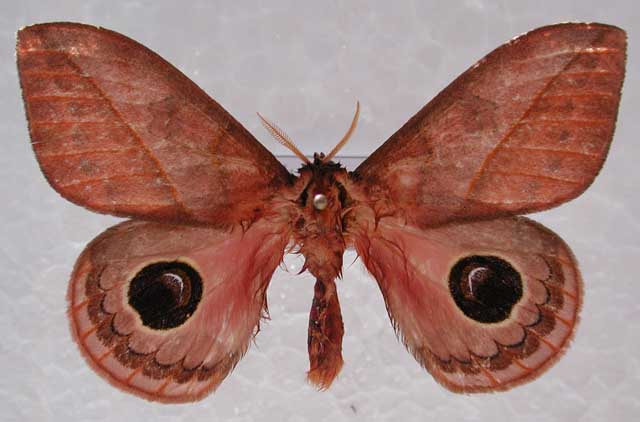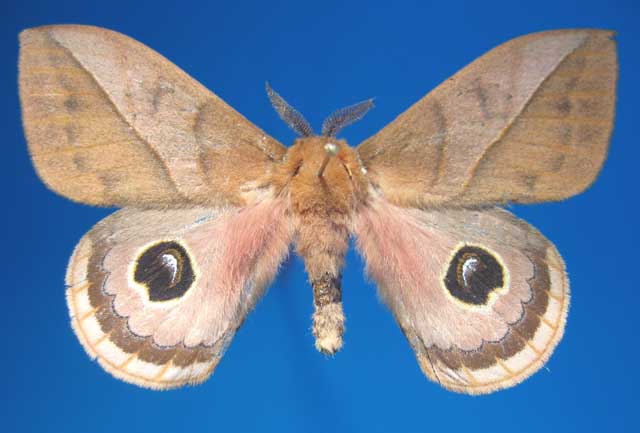Pseudautomeris chrisbrechlinae
Pseudautomeris chrisbrechlinae
Brechlin & Meister 2010

Pseudautomeris chrisbrechlinae male, Bolivia,
courtesy of Eric van Schayck,
very tentative id by Bill Oehlke.
TAXONOMY:
Superfamily: Bombycoidea, Latreille, 1802
Family: Saturniidae, Boisduval, [1837] 1834
Subfamily: Hemileucinae, Grote & Robinson, 1866
Tribe: Hemileucini, Grote & Robinson, 1866
Genus: Pseudautomeris, Lemaire, 1967 |
MIDI MUSIC
"Someone to Watch Over Me"
copyright C. Odenkirk
ON.OFF
<bgsound src="watch.mid" LOOP=FOREVER>
|
DISTRIBUTION:
Pseudautomeris chrisbrechlinae
(wingspan: males: 58-74mm; females: 94mm // forewing length: males: 30-37mm; females: probably larger) flies in
Bolivia: Chuquisaca: road Padilla Monteagudo, -19.5156, -64.1692, collected by Ron Brechlin, 2009-03-02;
Bolivia: Chuquisaca: Muyupampa, collected by P. Schmit, 2001-10-17;
Bolivia: Tarija: 10 km south to Carapari, Yacuiba, 2007-02-19; and
Argentina: Jujuy: Nationalpark Calilegua: curbside, 1km before summit, -64.8994, -23.6675, collected by A. Knorke.
Specimens have been taken at elevations of 400-1800m.

Pseudautomeris chrisbrechlinae/arminiyungasensis?? (wingspan 63mm), Coroico, La Paz, Bolivia,
courtesy of
Henrik Bloch, January 27, 2004, S16*11.498 W067*43.452, 1799m., 22C.
The specimen provided by Henrik Bloch is a better match by size for Pseudautomeris chrisbrechlinae but by appearance, colour and location it is a better match
for a small Pseudautomeris arminiyungasensis, and I favour the latter.

Pseudautomeris chrisbrechlinae male, 74mm, Chuquisaca, Bolivia,
on my home computer only.

Pseudautomeris chrisbrechlinae female, 94mm, Tarija, Bolivia,
on my home computer only.
FLIGHT TIMES AND PREFERRED FOOD PLANTS:
Specimens have been taken in January-February-March and September-October. There may also be flights in other months.
ECLOSION, SCENTING AND MATING:
Males use their more
highly developed antennae to seek out females who release an
airbourne pheromone into the night sky.
EGGS, LARVAE, COCOONS AND PUPAE:
Eggs are deposited in clusters of
6-40+ on hostplant twigs. Larvae have urticating spines and are gregarious, especially in the
early instars.
Larval Food Plants
It is hoped that this alphabetical listing followed by the common name of the foodplant will
prove useful. The list is not exhaustive. Experimenting with closely related foodplants is worthwhile.
The species name "chrisbrechlinae" is honourific for Dr. Christiane Brechlin, mother of Ron Brechlin.
Use your browser "Back" button to return to the previous page.
Return to Pseudautomeris Genus
Return to South American Saturniidae Direcotry
Return to Main WLSS Index



